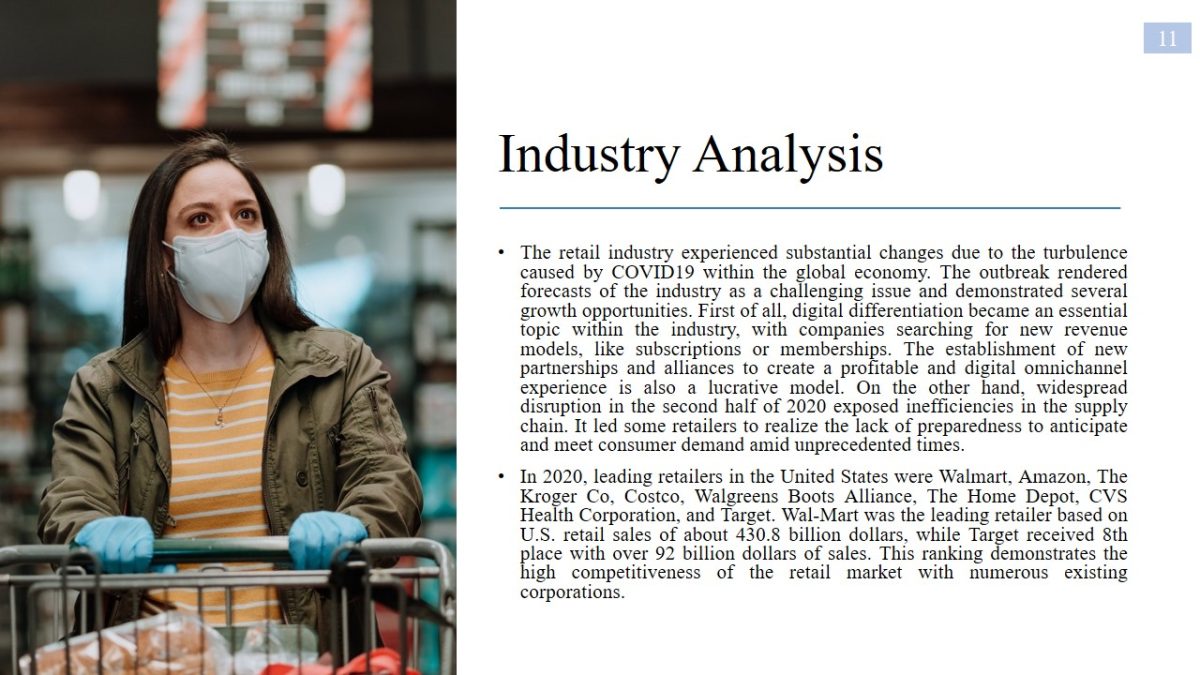Business Summary
Target Corporation is a large retailing company that was established in 1902. It offers a wide range of products such as everyday essentials, fashionables, and differentiated merchandise at discounted prices. The majority of general merchandise in stores owned by Target Co. are edited food assortments, perishables, dry grocery, dairy, and frozen items. The company also has digital channels that include a wide merchandise assortment: many items found in company-owned stores, along with a complementary assortment.
The company also makes a regular contribution to the local communities since 1946 in the shape of 5 percent from the profit. In 2020, the company achieved various breakthroughs in terms of profitability. The sales grew by more than $15 billion, which is the greatest peak prior 11 years. The total market share across five core merchandising categories reached approximately $9 billion. The company also peaked at a record-breaking $9.42 of adjusted earnings per share.
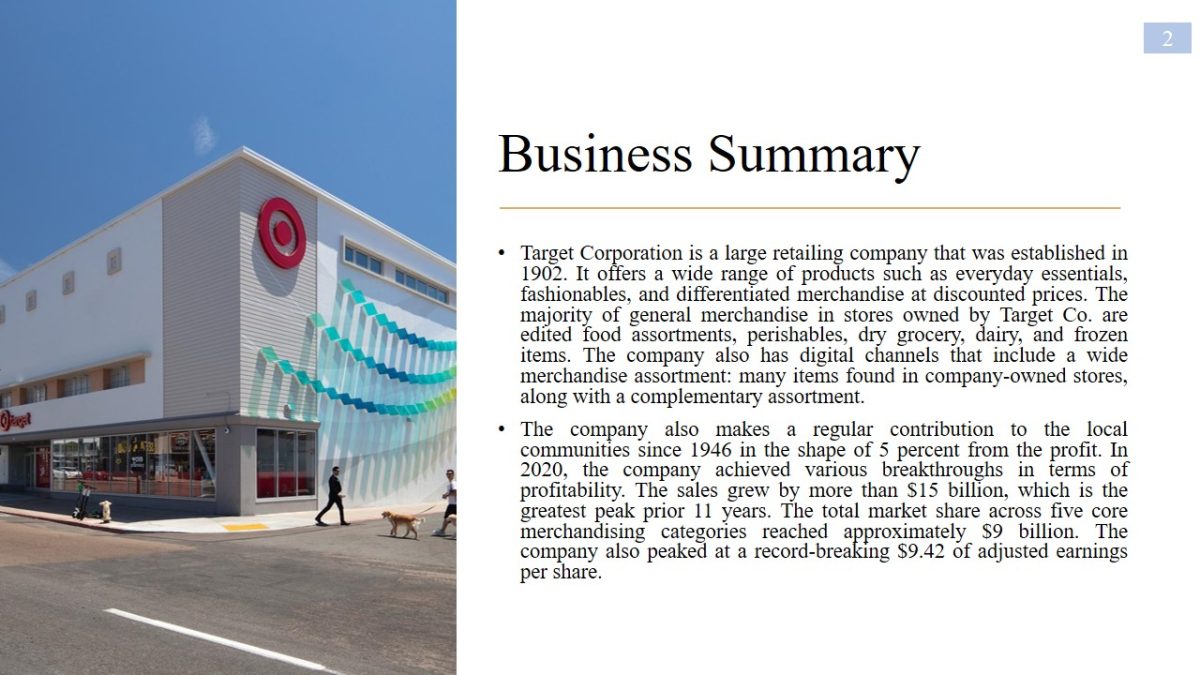
Strengths
- The company demonstrates high standards of business conduct due to its fame and positive reputation with regards to social responsibility and trendiness.
- Strong brand image, which is the merit of the corporation’s exceptional marketing and advertisement departments.
- The company’s mobile application contributed to the development of digital channels and increased measurement and reporting of online sales.
- The culture within the corporation illustrates concern for the safety and well-being of employees, which ensures loyal, long-term motivated employees.
- Partnership with minority professional societies for recruiting.
- Special onboarding and new hire programs to prepare and train employees.
- Typical customer includes educated adults in mid-40s who are financially more stable than customers in another age segment.
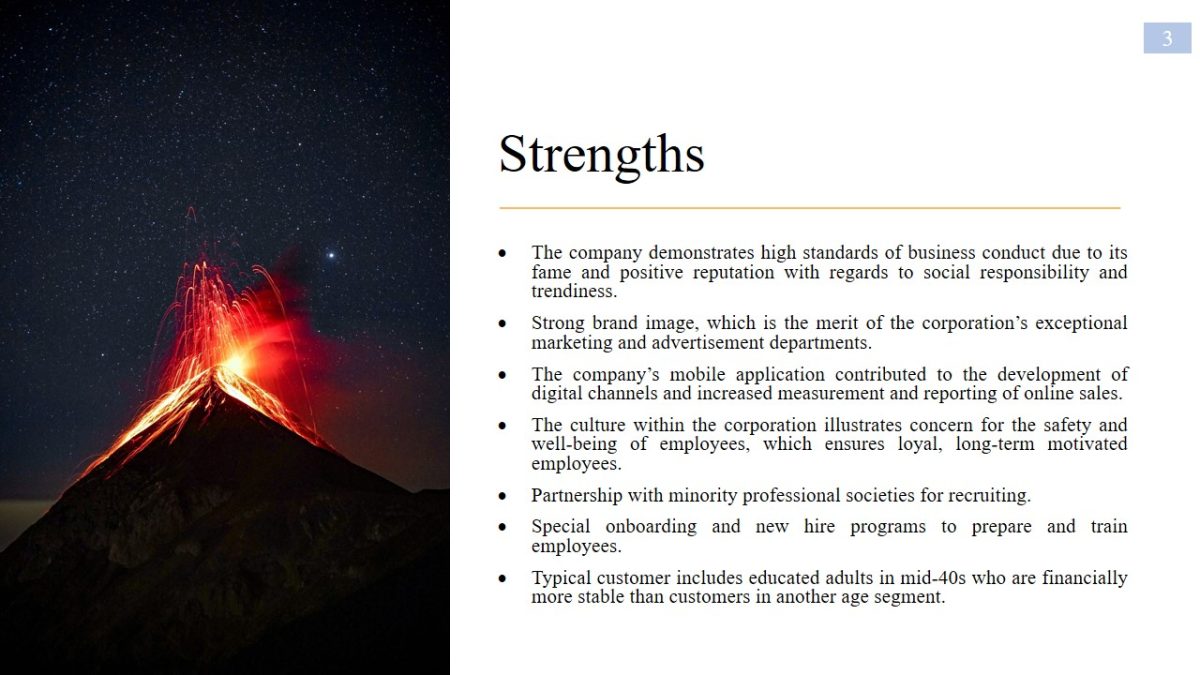
Weaknesses
- The market competitors such as Amazon and Walmart offer a much wider variety of products online which may attract the customer to the sites of competitors.
- The prices at Target are higher in comparison to rivals as the company charges about 15% more for groceries compared to Walmart.
- In 2014, Target had faced one of the worst data breach incidents. Nearly 70 million customers’ credit card information was stolen. Consequently, Target’s reputation received a severe blow, and the business had faced many class-action lawsuits.
- The company was not very successful in the expansion towards the international market. Target Co. opened 133 stores in Canada by 2015 but had to shut down everything due to the low profitability and greater competition.
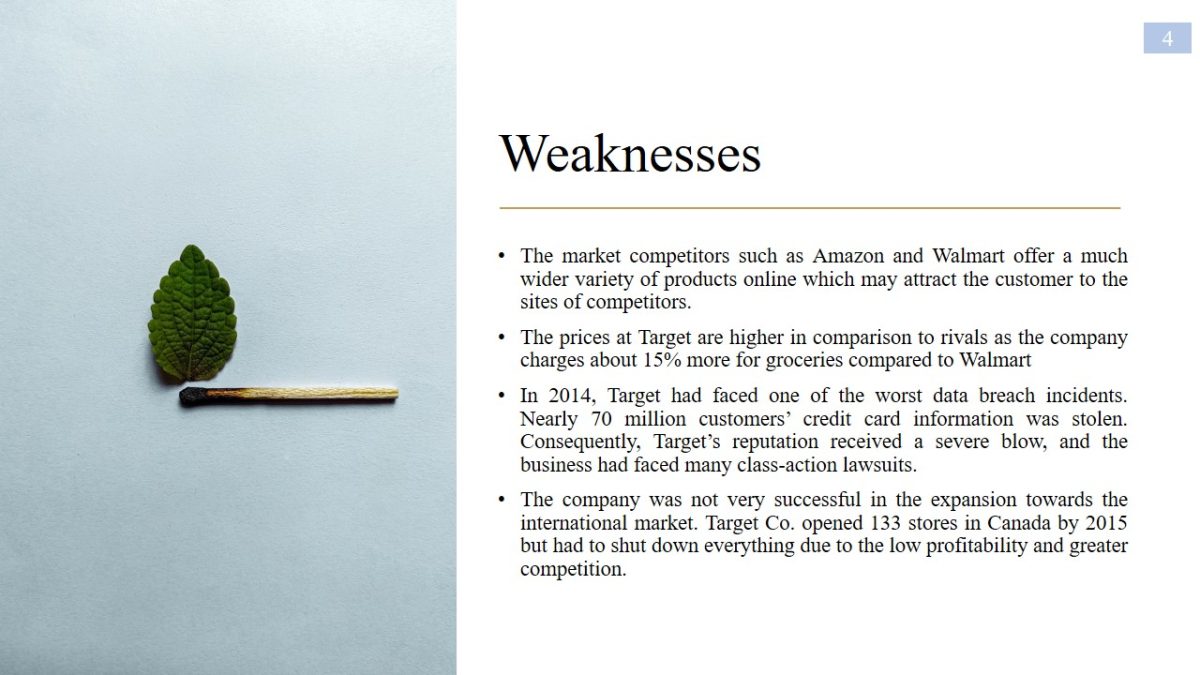
Opportunities
- The partnership with CVS, which was formed in December of 2015, could potentially provide the customers an opportunity to access industry-leading health care services in Target’s stores.
- Small scale stores are a lucrative opportunity for the expansion of the company’s presence in the industry because of the greater reach in dense urban areas and college campuses.
- Expansion of the RED card loyalty program by analyzing customer buying habits and including personalized marketing and promotion offers.
- The expenditures on goodwill and strong ties to communities where Target shops operate may improve the business networking and result in local tax breaks and or business-friendly policies.
- Key focus for Target should be on increasing differentiation from rival companies through the acquisition and promotion of exclusive brands and merchandise.
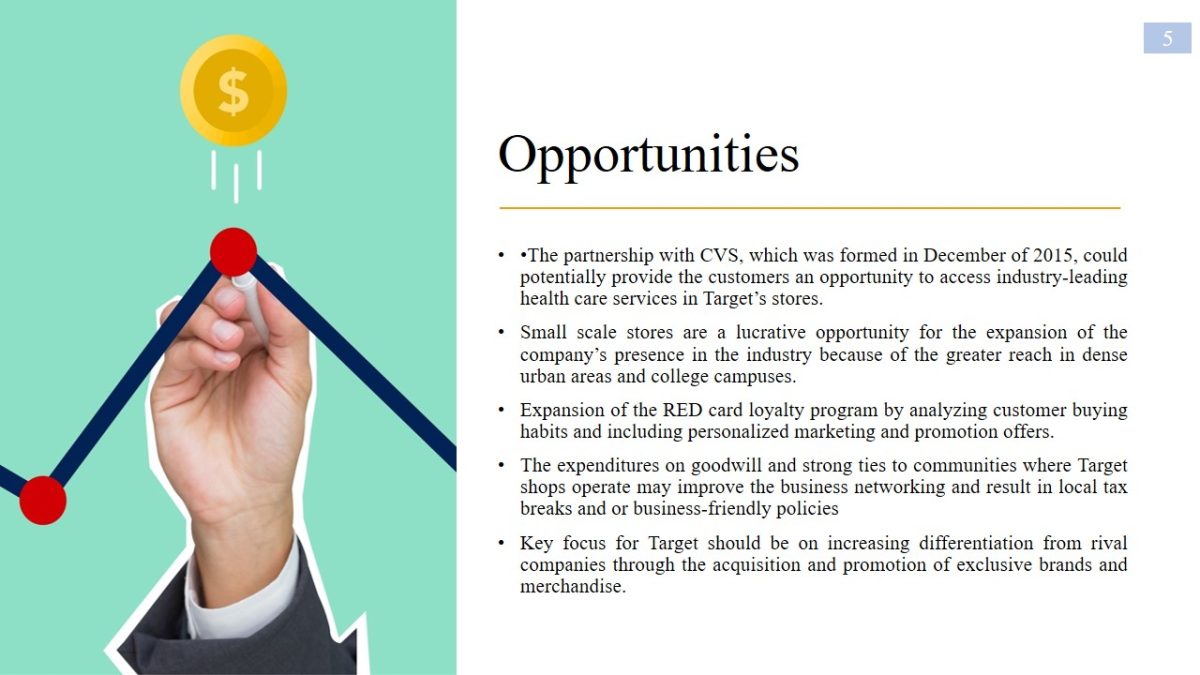
Threats
- The industry competition is intense as major retailers and minor shops try to get a hold of a larger market share. Major competitors include Walmart, Costco, Kroger, Home Depot, Amazon, Whole Foods, etc., which have numerous stores in close proximity to the local population.
- The failure to differentiate may serve as a threat to the corporation. Their brand loyalty may be affected due to the shift of numerous buyers towards online shopping with a greater variety of exclusive merchandise.
- The retail industry is capital intensive but easily replicable, which creates low entry barriers. Any company may potentially reduce the market share of Target by undercutting its prices.
- The macroeconomic conditions of the USA greatly affect the company’s total profits. Target Corporation is a primarily US-based company hence turbulence in the local economy negatively affects the business.
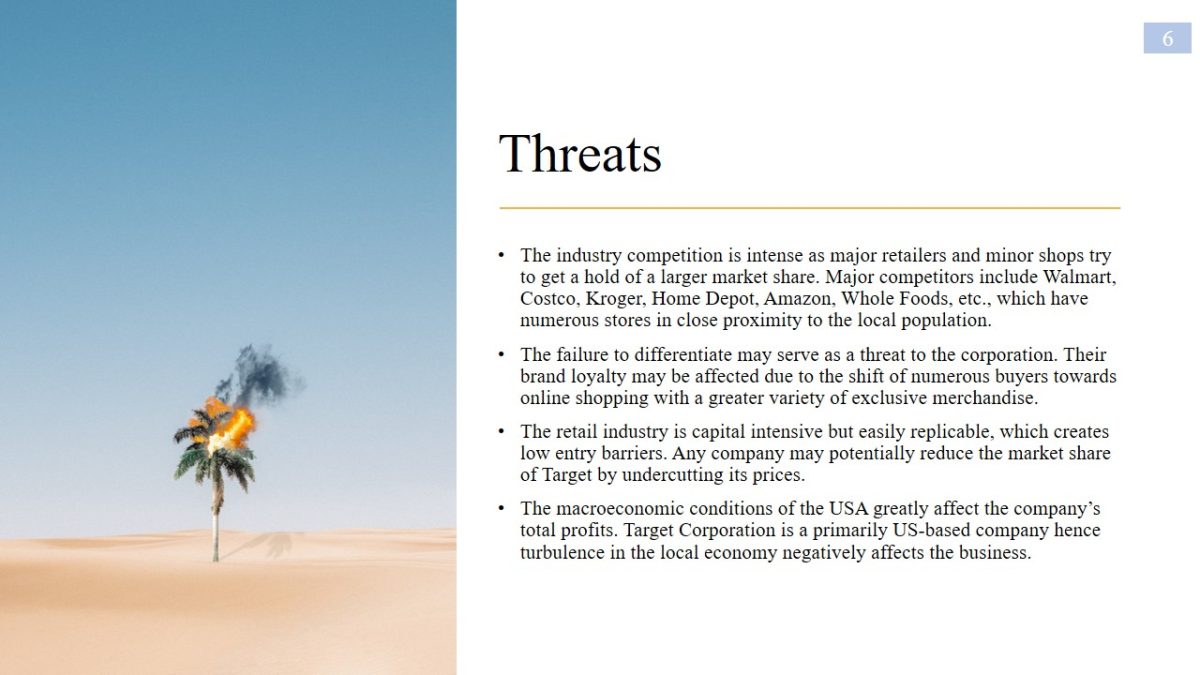
Government Regulation
Government regulations on Target corporation include the product safety laws and cybersecurity requirements. All of the company’s vendors need to comply with all applicable safety standards. The company could be subjected to government enforcement action, costly product recalls, and numerous other liabilities if food or drug contamination and product defects would be identified. Consequently, the sales and operating results of the corporation would experience adverse effects.
The growth of the digital market is enormous and leads to an increase in governmental interventions to regulate the market. Primarily information security, cybersecurity, and data privacy concerns are growing. Cybersecurity regulations are increasingly demanding, and complying with them may impose substantial costs. They require changes to business practices, limit the ability to process data that is used to provide a differentiated consumer experience, and expose the company to litigation and regulatory risks.
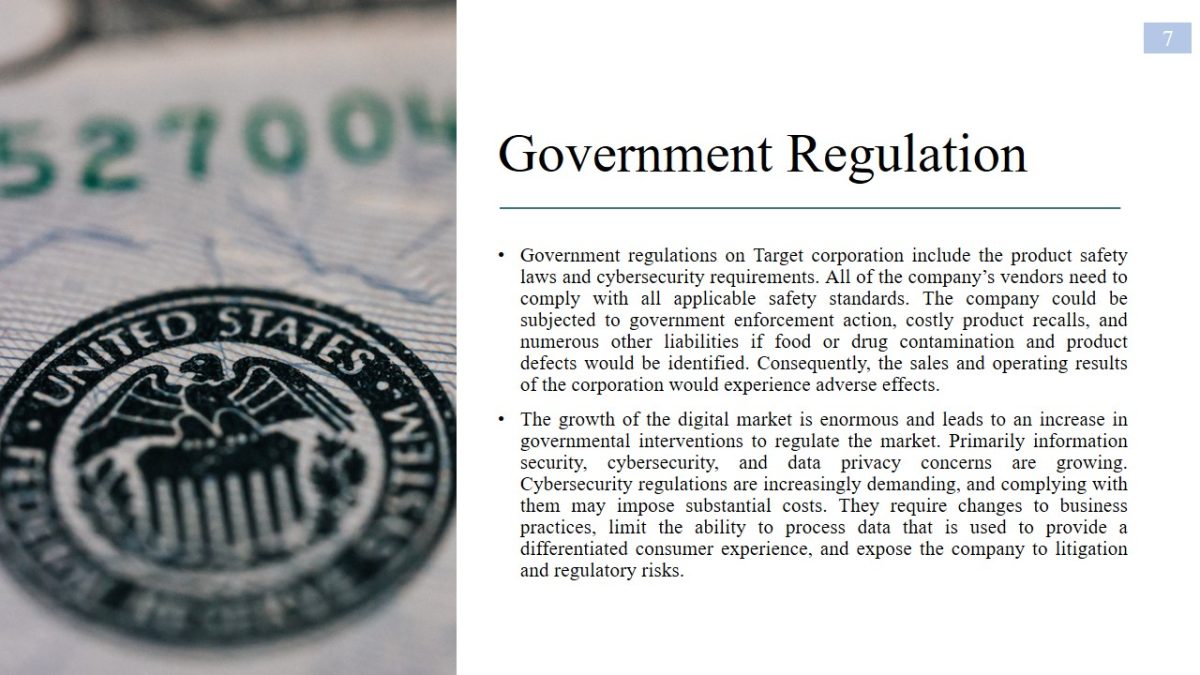
Aggregate Demand
Changes in aggregate supply and demand impact the price of goods and services. This could potentially have a drastic impact on the operational expenses because an increase or decrease in the cost of goods will impact the end price of the product. Therefore, the company’s revenues and/or operational costs will change. Moreover, Target would experience an intensification of competition as the price levels would start to vary drastically.
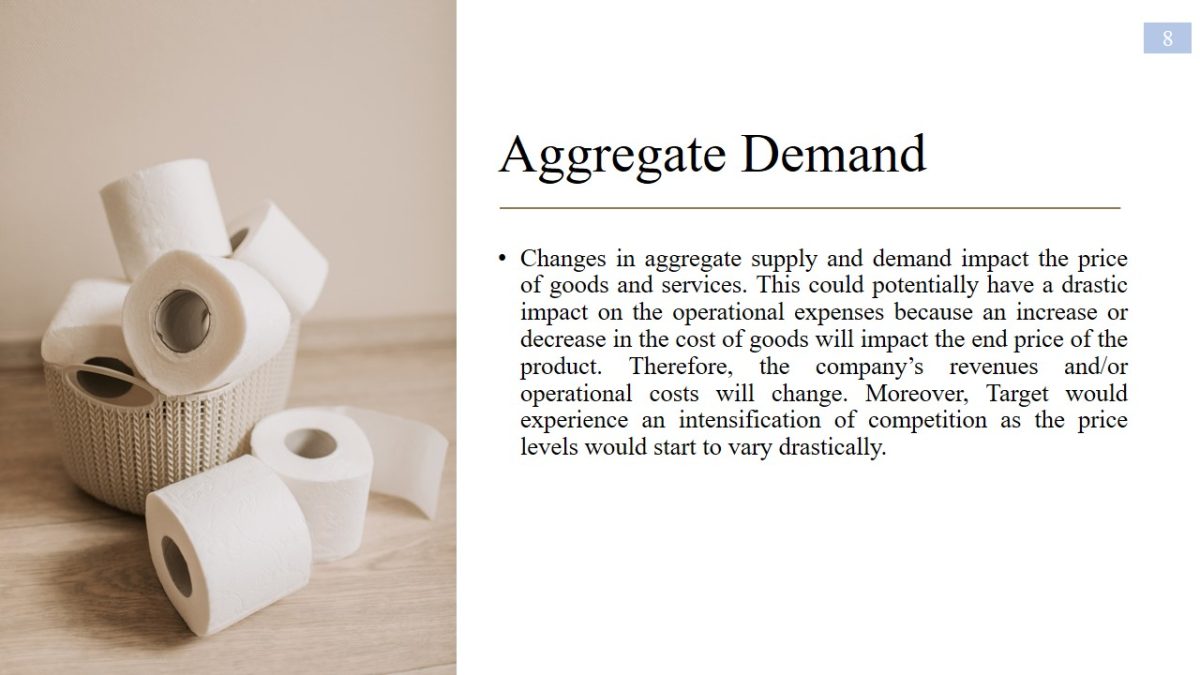
Fiscal Policy
Fiscal policies affect the cost of business for Target’s retail chain, consumer demand, and competitiveness. Tax-related policies affect consumers’ buying power as the net amount of their income could be diminished by higher tax rates. Thus, customers might take the decision to cut their additional expenses and focus only on necessary products. Furthermore, it will increase the competitiveness in pricing among retails stores or the company’s rivals. Therefore, Target’s differentiation from its main competitor Walmart, in other words, a higher price tag in favor of product quality, will not be as meaningful if it has an enormous impact on the customer budget.
On the other hand, increased government spending may contribute to the deficit that may cause interest rates to increase. The growth of interest rates changes the customer’s buying habits and preferences which could divert their attention from goods and services provided by Target.
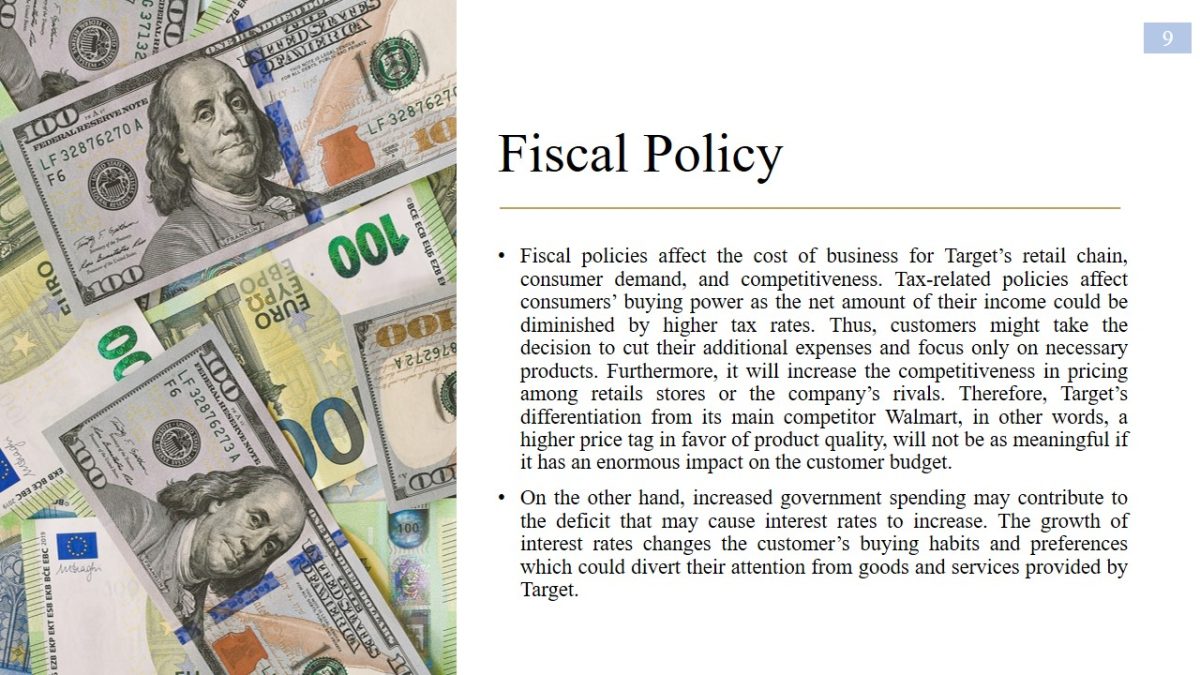
Financial Data
The company trends for the past two years demonstrated stable growth in terms of sales and profit. Total sales were equal to over 92 and 72 billion dollars for 2020 and 2019, respectively. Simultaneously, net earnings demonstrated the figures of over 4,368 and 3,281 million dollars.
The operating cash flow was $10.5 billion for 2020, an increase of $3.4 billion, or 48.3 percent, from $7.1 billion for 2019. The comparable sales growth of 2020 was outstanding with 19.3% in comparison to 3.4% in 2019.
Even though the global pandemic diminished the influence of numerous companies, Target demonstrated its solid presence on the market and was able to turn the situation into a favorable outcome. This is the result of the timely enaction of dozens of safety, social distancing, and cleaning measures designed to protect the customers and employees. However, a continuation of the situation could negatively impact the company as the major contributions in 2020 were the result of rising digital channels.
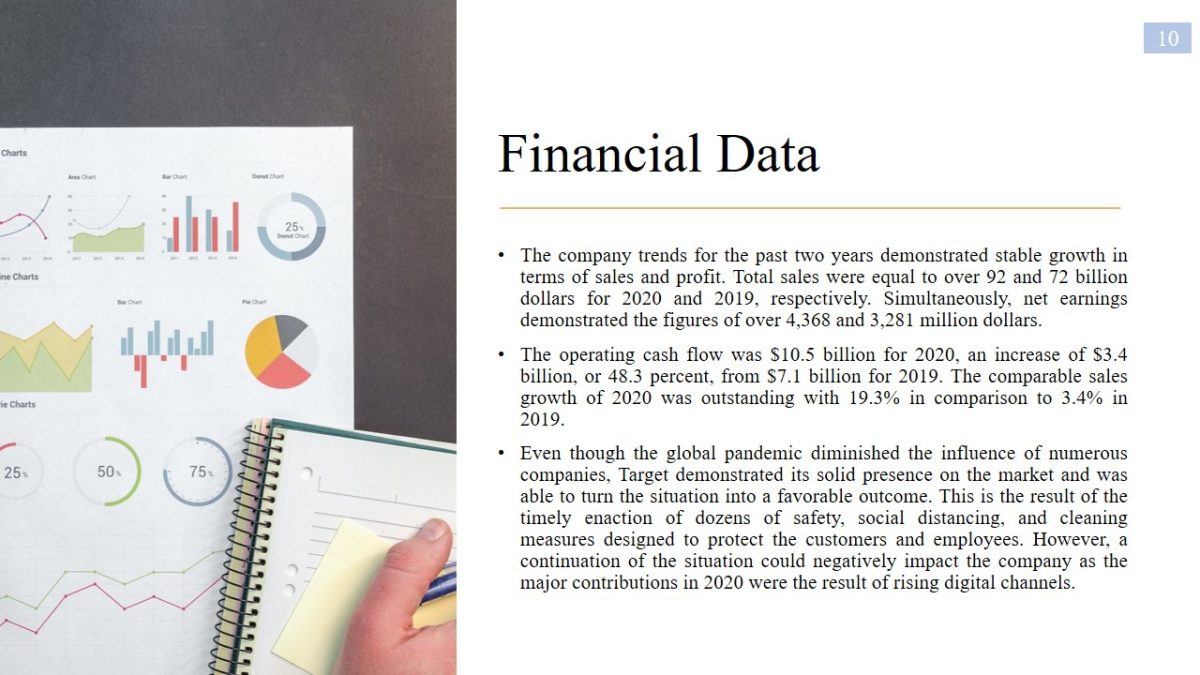
Industry Analysis
The retail industry experienced substantial changes due to the turbulence caused by COVID19 within the global economy. The outbreak rendered forecasts of the industry as a challenging issue and demonstrated several growth opportunities. First of all, digital differentiation became an essential topic within the industry, with companies searching for new revenue models, like subscriptions or memberships. The establishment of new partnerships and alliances to create a profitable and digital omnichannel experience is also a lucrative model. On the other hand, widespread disruption in the second half of 2020 exposed inefficiencies in the supply chain. It led some retailers to realize the lack of preparedness to anticipate and meet consumer demand amid unprecedented times.
In 2020, leading retailers in the United States were Walmart, Amazon, The Kroger Co, Costco, Walgreens Boots Alliance, The Home Depot, CVS Health Corporation, and Target. Wal-Mart was the leading retailer based on U.S. retail sales of about 430.8 billion dollars, while Target received 8th place with over 92 billion dollars of sales. This ranking demonstrates the high competitiveness of the retail market with numerous existing corporations.
